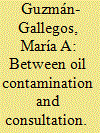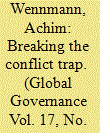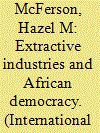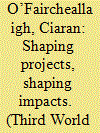|
|
|
Sort Order |
|
|
|
Items / Page
|
|
|
|
|
|
|
| Srl | Item |
| 1 |
ID:
152784


|
|
|
|
|
| Summary/Abstract |
In this article, I explore the interconnections among severe oil contamination, a state-led consultation process, and compensation practices in Peru’s oldest oilfield. I discuss the way in which four indigenous organisations and their constituencies produced evidence of oil contamination, and forced the state to question Peru’s current oil extraction practices. I look at the compensation demands and corporate payments that followed, and examine how compensation became a dominant tool for both appeasing increasing uprisings, and for counteracting what local people perceive as state abandonment. Focusing on the effects that compensation measures have on daily life, I analyse how equivalences between affected water and lands, on one hand, and state investments and monetary payments on the other, are established. I discuss how these equivalences have led to making indigenous ways of life irrelevant, and how this has been reinforced by the emphasis on due process during state-led consultation.
|
|
|
|
|
|
|
|
|
|
|
|
|
|
|
|
| 2 |
ID:
104445


|
|
|
| 3 |
ID:
100196


|
|
|
|
|
| Publication |
2010.
|
| Summary/Abstract |
y the well-known "resource curse," the abundance of oil and other valuable minerals has been associated with patrimonialism and repression-in Africa and elsewhere. This article demonstrates a self-sustaining dynamic: lack of accountability enables elite appropriation of resources which in turn raises the monetary value of political control and finances continued repression. Several initiatives have been taken in recent years to foster transparency in mineral production and revenue, but with marginal impact. Lifting the curse requires a robust global effort to discourage "plunder oil." This is unlikely as long as the benefits of cheap oil to the importing countries outweigh the costs to the population of the exporting countries. The oil addiction of developed and emerging economies remains an oil malediction for African democracy. But launching a sustained international debate could eventually bear fruit.
|
|
|
|
|
|
|
|
|
|
|
|
|
|
|
|
| 4 |
ID:
152797


|
|
|
|
|
| Summary/Abstract |
This article analyses mining policy as an indicator of a larger question: are some Third World governments starting to steer away from plunder ‘extractivism’ towards a paradigm that prioritises the environment? We begin with the cases of El Salvador and Costa Rica, which have major mining bans in place. We then present the results of our research in which we find five other countries with noteworthy mining-policy shifts: Panama, Colombia, Argentina, Chile, and New Zealand. A sixth country, Honduras under President Zelaya, stands as a recent historical case of how sensitive such a policy change can be. A key take-away from our article is that critical development scholars and practitioners need to look more closely at the mining sector – not simply to analyse case studies of specific mining protests and resistances to extractivism, although these are of course important. Rather, there is a need to investigate policy changes that just might be indications that the era of unquestioning extractivism has ended and that at least some governments are initiating policies to incorporate environmental externalities, policies that suggest a changing development paradigm in the direction of environmental – and concomitant social and economic – ‘well-being’ as envisioned in buen vivir.
|
|
|
|
|
|
|
|
|
|
|
|
|
|
|
|
| 5 |
ID:
162298


|
|
|
|
|
| Summary/Abstract |
Notable spatial variation in public opinion on climate change and energy policy has been demonstrated at various geographic scales (Howe et al., 2015). Understanding the source of this variation is useful for policymakers, energy developers, and utility providers in predicting how different locales may respond to newly proposed policies and energy developments, particularly those encouraging renewable energy. Using nationally representative survey data from 2008 to 2015, we employ hierarchical linear regression to examine variation in public support for renewable energy policy, focusing on how residence in areas with extractive activities may be related to attitudes toward renewable energy policy. We test the influence of several county-level indicators, including oil production, gas production, and economic dependence on the mining sector. We also test for individual factors, including political ideology, belief in anthropogenic climate change, and several sociodemographic variables. Results suggest that individuals living in both mining-dependent counties and counties with natural gas production are somewhat less likely to support renewable energy policies than individuals living outside such places. At the individual level, belief in anthropogenic global warming is the strongest predictor of renewable energy policy support, and liberal political ideology, being more educated, and being female are also positively associated with policy support.
|
|
|
|
|
|
|
|
|
|
|
|
|
|
|
|
| 6 |
ID:
152789


|
|
|
|
|
| Summary/Abstract |
Large-scale mineral extraction is often accompanied by local conflicts, reflecting the fact that affected communities feel the costs of development but enjoy few of its benefits. Much of this conflict could be mitigated if communities could influence the design of projects and of management systems intended to minimise their impacts. This paper examines the potential role of community-controlled impact assessment, combined with negotiation of binding agreements between communities and developers, to allow affected communities to shape the impacts of extractive projects. It considers the wider political factors that must be addressed if these mechanisms are to be effective.
|
|
|
|
|
|
|
|
|
|
|
|
|
|
|
|
| 7 |
ID:
152787


|
|
|
|
|
| Summary/Abstract |
In the context of a growing number of socio-environmental conflicts, different actors emphasise that territorial planning promises to strengthen democratic participation, reduce conflicts, and enable the coexistence of mining with other economic activities. As there are few studies on these processes, this article contributes by asking: To what extent do ecological and economic zoning and related territorial planning (ZEE-OT) open up a decentralised political space for influencing territorial development? Based on interviews and written documents, the article shows that without a basic agreement regarding the purpose and decision-making structures of ZEE-OT, these processes are unlikely to reinforce more democratic forms of territorial governance.
|
|
|
|
|
|
|
|
|
|
|
|
|
|
|
|
| 8 |
ID:
149901


|
|
|
|
|
| Summary/Abstract |
In the last decade, the Extractive Industries Transparency Initiative (EITI) has grown in both popularity and influence. The ascendance of EITI is surprising because traditionally, leaders of resource-rich states prefer to tightly control their extractive industries. This paper investigates the underlying causes of EITI membership in order to understand its acceptance, even among some of the most authoritarian regimes. The paper argues that leaders of resource-rich countries use the EITI to consolidate their international prestige as eager reformers, which serves to both maintain and lure foreign investment. The cross-national and interrupted time series analyses reveal that EITI members not only have higher FDI levels compared to non-members, but these investments increase once countries join the initiative.
|
|
|
|
|
|
|
|
|
|
|
|
|
|
|
|
|
|
|
|
|